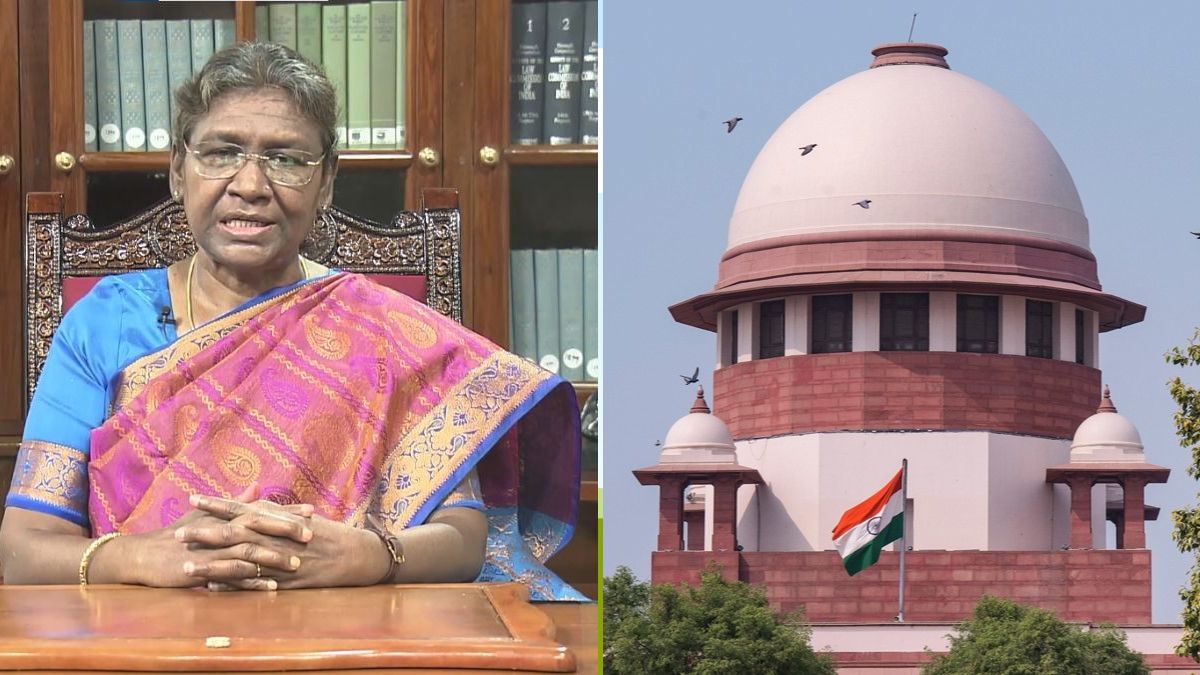Presidential Reference hearing | 'What’s wrong with consulting the court?': SC deflates maintainability objections

A five-judge Constitution Bench of the Supreme Court on Tuesday took a firm stance against objections raised by Kerala and Tamil Nadu regarding the maintainability of a Presidential Reference under Article 143(1) of the Constitution.
The bench is led by Chief Justice of India B.R. Gavai and comprises Justices Surya Kant, Vikram Nath, P.S. Narasimha, and Atul S. Chandurkar.
ALSO READ | Centre backs Governors as guardians, not post offices, ahead of Presidential Reference hearing on August 19
“When the Hon’ble President is seeking views of this Court, what is wrong in that? Are you really serious?” the bench asked, with a hint of disbelief.
On Article 200 and President Murmu's 14 questions
On April 8, 2025, a two-judge bench delivered a landmark judgement in the 'State of Tamil Nadu vs. Governor of Tamil Nadu' case, ruling that neither Governors nor the President may indefinitely delay action on bills passed by legislatures.
The court delineated that under Article 200, Governors had only three options: to assent, withhold (and return for reconsideration), or reserve a bill for presidential consideration with strict timelines enforced.
Any delay beyond these windows is liable to judicial review (unless justified).
Soon after, President Droupadi Murmu invoked her power under Article 143(1) on May 13 by referring 14 questions to the Supreme Court.
These queries challenge whether the Court may impose timelines on the President and Governors, whether such actions infringe discretion under Articles 200 and 201, and if the Court can chart procedure where the Constitution is silent.
Opposition from Kerala and Tamil Nadu
The Kerala and Tamil Nadu governments opposed this reference, arguing that the issues are no longer res integra (open questions), and that safe jurisdiction should be by way of a formal review petition rather than an Article 143 reference.
Senior Advocate K.K. Venugopal, appearing for Kerala, contended that once a judgement settles an issue, a Presidential reference cannot be used to circumvent review procedures.
On judicial overreach, Articles 142 and 143
However, the top court rebuffed these objections, reminding lawyers that its role under Article 143 is purely advisory, and not applicable for appellate review. CJI Gavai stressed: “We are sitting in an advisory jurisdiction,” and not functioning as an appellate bench.
Justice Surya Kant clarified that while the Court could opine that a judgement may be legally questionable, such an advisory opinion does not overrule the earlier decision.
“A view can be overruled, not decision.”
This dispute encapsulates the tug-of-war between judicial oversight and executive discretion.
Attorney General R. Venkataramani, while beginning his arguments, said the court’s extraordinary powers under Article 142 could not be stretched to disturb the constitutional balance.
“The power of Article 142 cannot be used by the judiciary to violate the Basic Structure of the Constitution and take over Executive or Legislative functions,” the AG told the bench.
According to Venkataramani, such judicial directions risk crossing into law-making terrain.
“Article 142 cannot be used to grant deemed assent,” he said, stressing that the provision was never meant to substitute constitutional procedure.
The AG reached back to the Third Judges’ case, which was itself a Presidential Reference that eventually gave birth to the collegium system for judicial appointments.
Quoting from that opinion, he reminded the bench that Article 142 “cannot be used to supplant substantive law” or "to build a new edifice where none existed earlier by ignoring express statutory provisions".
Solicitor General Tushar Mehta urged the bench to see the issue through the prism of constitutional intent and democratic legitimacy.
Beginning his submissions, Mehta clarified that the reference was specific and precise, not a vague attempt to reopen the Tamil Nadu judgement.
The bench, however, reminded him that the April ruling arose from an egregious situation in Tamil Nadu where the Governor had indefinitely withheld bills, forcing the Court to step in.
Justice P.S. Narasimha observed that the conclusion in that case “was not meant to act as a precedent".
On Ambedkar's past intervention
The Solicitor General pointed out that the draft Constitution had originally prescribed a six-week timeline for Governors and the President to decide on bills. It was Dr B.R. Ambedkar who intervened, softening the provision to the phrase “as soon as possible” in Article 200.
CJI B.R. Gavai explained that this phrase could not mean indefinite delay.
“As soon as possible,” he said, must be read as within a reasonable time. The Bench suggested that Ambedkar’s compromise was still intended to keep decisions close to the six-week framework.
On the legitimacy of Governors and the President
Justice Narasimha recalled that the longest withholding of assent came during President Giani Zail Singh’s tenure, when he sat on the Postal (Amendment) Bill.
Defending the role of Governors and the President, Mehta argued they too represent democratic will, even though they are not directly elected.
“The President is elected, and Governors are appointed through the President by the Council of Ministers,” he said. In a republican democracy, he added, appointments made by elected representatives are also legitimate centres of democratic faith.
The arguments in the case remained inconclusive and will continue on Wednesday as well.
India